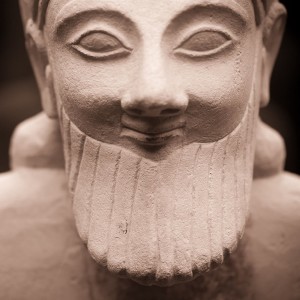
Primary sources are invaluable as they give us direct insight into the period in question -- but they also need to be treated with caution. Let's take today's reading for example: Isocrates' The Evagoras is one of our principal sources for the Classical Period in Cyprus. For Isocrates, Evagoras was the model ruler. It depicts the king through the lens of Isocrates’ personal beliefs, which, however, need to be critically analyzed. He is a rhetorician and a sophist. Ostensibly, Isocrates wants there to be unity between Spartans and Athenians -- but under Athenian hegemony. For Isocrates, to truly be a Hellene one must learn to think and live as a Hellene, i.e., possess Athenian education. Athens to Isocrates is, of course, the pinnacle of Greek culture to which a great debt is owed.
Evagoras of Salamis, then, fits the Isocratean mould and we can see what makes his character so appealing to Isocrates. According to Isocrates, Evagoras “inspired respect, not by the frowning of his brow, but by the principles of his life” (Isoc. Evagoras 9.44). Not only is Evagoras philhellenic, he is more specifically phil-Athenian. As king he “observed Greek institutions,” “the liberal arts” and “[Greek] education” (Isoc. Evagoras 9.50). He possessed all the qualities that made him a Philosopher King in his own right but most importantly, in the view of Isocrates, he was a true philhellene.
We must be cautious though; the Evagoras was written as an encomium (a eulogy) and according to Plutarch, was commissioned by his son and heir, Nicocles. Evagoras’ qualities are showed as unparalleled, if not, divinely bestowed -- inherited from his ancestors, endowed by nature and willed by Zeus himself. It presents a romanticized -- and idealized -- philhellenic king. Isocrates tells the reader that, lamentably, in the years preceding Evagoras “the best rulers were those who treated the Greeks in the most cruel fashion” (Isoc. Evagoras 9.49). Yet Evagoras paradoxically campaigned against other philhellenic city-states on Cyprus. We must remember that historically, Cyprus had been fragmented politically into quasi-city kingdoms as each vied for its own independence (even the term "city-kingdoms" can be somewhat problematic). They were hardly driven by nationalistic or patriotic Hellenic sentiment, but by self-preservation. The Evagoras makes no mention of this, nor does it navigate the questionable Persian/Athenian alliance during the Corinthian War. That, of course, would be inconsistent with the story Isocrates weaves. Isocrates is decisively not an historian.
But I’m far from an expert on this time period. That’s why I hope you join me on August 2nd as Professor Christian Körner from the University of Bern discusses "Cyprus Between the Assyrian and Persian Empires." For more frequent updates, follow The History of Cyprus on Instagram: https://www.instagram.com/thehistoryofcyprus/
More Episodes
 2024-10-10
2024-10-10
 278
278
 2024-08-15
2024-08-15
 355
355
 2024-07-15
2024-07-15
 424
424
 2024-06-15
2024-06-15
 468
468
 2024-05-15
2024-05-15
 433
433
 2024-04-02
2024-04-02
 844
844
Create your
podcast in
minutes
- Full-featured podcast site
- Unlimited storage and bandwidth
- Comprehensive podcast stats
- Distribute to Apple Podcasts, Spotify, and more
- Make money with your podcast
It is Free
- Privacy Policy
- Cookie Policy
- Terms of Use
- Consent Preferences
- Copyright © 2015-2024 Podbean.com





